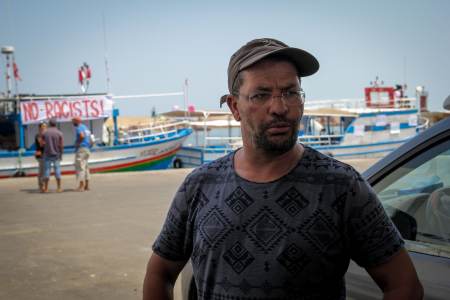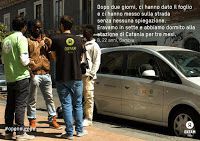Western Sicily: A Week of Hell
Over the
week just gone, our attention has turned not only to the landings at Palermo,
Porto Empedocle, Trapani and back to Porto Empedocle again, but also to the
number of requests for help from the provinces of western Sicily, a place
interesting not only for its high climatic temperatures but also the neglect,
abandonment and desperation which makes migrants’ stay in Italy a living hell.
Foto: Alberto Biondo
But we’ll
proceed in turn: first, the landing at Palermo on June 13th, I which
322 people arrived (on the Spanish ship Rio Segura), where the Questura, along
with Frontex, went on the hunt for presumed smugglers: “you have to find at
least three” are the words of one functionary on duty! At the end there were 7
presumed smugglers identified (6 Egyptians and 1 Ethiopian) and three
witnesses. Another newcomer, this time a young doctor from the ASP* of Palermo,
thought it good to substitute juridical authority with himself: “This is a
smuggler, so he’s got nothing [editor’s note: no health problems], he can be
taken away”; and to provide advice on the use of protection to the drivers of
the buses used for transferring new arrivals: “these ones are dangerous,
they’re making us ill!” And to think that the migrants, having spent 7 days at
sea (from Egypt to Palermo) arrived at the port of Palermo smiling and happy,
applauding on the ship as it docked. But as soon as they saw the ranks of
police, Guardia di Finanza and Frontex they stopped waving, understanding that
their agony was not over.
A great
number of young people, really very young, were shuttled to the Questura, where
they have been identified, and then to the centres for minors, which remain in
endless economic crisis due to the lateness of payments
by local councils. These are the same minors who, when they become adults
will, in the majority of cases, be abandoned in the street because the centres
for minors have no interest in keeping them (better to have fresh goods which
guarantee a continual income), and will be shown the door before they have
found an adequate alternative solution for their accommodation. Those who have
recently become adults, victims to a lack of planning and horrendous management
(carried out for interests other than those of the minors) are easy prey for
criminal networks, ending up exploited and abused.
This is
also the result of a recent ministerial communication, addressed to the
Territorial Commission, which stopped the practice of automatically allowing
minors a permit to stay on at least humanitarian grounds, even if they were
soon to become adults, with the result now (even in this case) of their being
shown the door as soon as they reach 18, with nothing in hand but a rejection
of protection and no future other than being intercepted by one of the voluntary
associations.
The Italian
reception system, set up like this, contributes to make the lives of both
adults and minors a living hell: the problem of the lack of posts in the CAS*
pushes the managing bodies to utilise the possibility of “revocations from reception”
in an instrumental fashion, and with even more hasty processes than in the
past. This came to pass last week in Trapani, where 11 migrants left the “Villa
Santandrea” CAS* managed by Badiagrande in Valderice. Having been transferred
from one centre to another, they arrived in Valderice after a year of having
gone nowhere, in a hellish limbo, and with the threat that they would not get
cigarettes or their pocket money if they made even the smallest complaint.
These 11 migrants, exasperated by the unacceptable conditions to which they
were condemned, were dumped at the Trapani train station, where they were
intercepted by the Red Cross and, thanks to this, have come to Palermo in order
to continue their dim journey of hope.
This is a
system, therefore, which creates invisible people, and which makes people into
illegal immigrants without any logic, but with the clear objectives of
maintaining a high level of emergency in a way which allows corrupt investments
and provides work for the professionals in the ‘welcoming’ business.
This is the
only way in which one can explain the fact that on May 25th the
Ministry of the Interior did not authorise the Prefecture of Trapani to make
the transfers from the Hotspot at Milo, in which there are currently 200 people
(both men and women, and around 20 minors), all of whom have been identified
and illegitimately detained: all to the advantage of Badiagrande’s managers’
bank accounts.
The same
situation has been confirmed at Lampedusa, where up till yesterday the Hotspot
(partly uninhabitable following the fire in the middle of May) housed 322
people, of which 77 are minors (some less than 13 years-old) and many women,
living in the same conditions without any necessary discrimination. This
morning 145 people were transferred (including women and children,
unaccompanied and otherwise), who had arrived on the island on 27–29 May. The
destinations are unknown, save for a few dozen adult men who have been taken to
the Agrigento Hub (Villa Sikania). Migrants have been staying on Lampedusa for
much longer than the 3–4 days foreseen by law. At the time of writing there are
still people who arrived on 30 April, and minors who have been present on the
island since mid-May. Any normal, private complex would have been closed and
the managers arrested, but instead the state continues to act criminally, for
which the migrants pay the high price of living in an open-air prison, with
earnings for Misericordie (the continuing managing body, given that the last
tender was blocked due to administrative and bureaucratic problems).
At “Villa
Sikania” the situation is unchanged. For more than two months it was known that
there are around 300 people there due to a lack of transferrals. But as if by
magic, at the same time as the disembarking at Porto Empedocle and Trapani, the
Minister found hundreds of place in other regions throughout Italy for the
migrants (especially those from Subsahara) at the Siculiana Hub*, so at to make
space for the new arrivals, who tomorrow will join the few dozen Eritreans
coming from Lampedusa. Again, in the only regional Hub*, the Cometa cooperative
(connected to the Acuarinto association in Agrigento) continues to earn money
thanks to political choices which are entirely inadequate for safeguarding
people’s lives and stability.
These are
people who are victims of war, of hated in their countries, of the egoism and
greed active throughout the world, who aside from having seen death at close
quarters (at the last landings at Porto Empedocle on 14 and 17 June, there were
3 corpses), they are forced to renounce their lives, attempting to survive in
centres of “unwelcoming” or on the street, like the four Egyptians who, in the
past few days, have been rejected by the Questura of Agrigento and left at the
train station.
This is
also the hell lived through by the 111 migrants who were disembarked on June 17th
at Agrigento, and the 440 taken in recent days to the Hotspot at Trapani. No
one know for how long they will be there, not why, given that everything
remains unclear in this system.
Alberto
Biondo
Borderline
Sicilia
*ASP – Azienda sanitaria provinciale: Provincial Health Agency
*CAS –
Centro di accoglienza straordinaria: extraordinary reception centre
*HUB – the
new name for huge distribution centres for refugees
Translation:
Richard Braude



